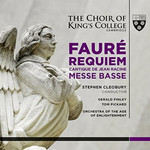|
Back
10/07/2014
Gabriel Fauré: Requiem (ed. Marc Rigaudière) – “Offertoire” from Requiem (ed. John Rutter) – Cantique de Jean Racine – Messe basse
Gerald Finley (baritone), Tom Pickard (treble), Douglas Tang (organ), Tom Etheridge (organ), Choir of King’s College, Cambridge, Orchestra of the Age of Enlightenment, Stephen Cleobury (conductor)
Recorded in the Chapel of King’s College, Cambridge (9-14 January 2014) – 51’33
King’s College Choir KGS 0005 Hybrid Super Audio CD with booklet essays in English, French, and German

   
Like so many compositions, from even as late as the late 19th century, Fauré’s Requiem has endured many editions in the search for authenticity. Accordingly, it has a distinguished recorded legacy, most members of which are authentically troubled despite being well performed. Advocates for Historically Informed Performance will find this newest release from Choir of King’s College Cambridge especially enticing.
The “concert” version that most listeners know today was prodded by Fauré’s publisher nearly 13 years after the piece’s successful premiere. The eminent composer John Rutter provided a significantly reduced orchestration some 20 years ago that went back to the 1894 sources to correct several errors and reconstruct the forces Fauré originally intended. That edition betrayed the intimacy and awe of Fauré’s very personal, religiously rebellious work.
This edition by Marc Rigaudière goes a step further and recreates the piece as it was performed in 1889. The orchestration is similar to Rutter’s, but the largest change is a truncated “Hostias” which includes only the baritone solo, the “O Domine” chorus bookends are excised.
The effect is downright revelatory. Removing the “O Domine” choruses sets an entirely new trajectory for the piece. In addition to removing about 4 minutes from a short work, the immediate transition from the D-minor “Kyrie” to the D-Major “Hostias” is uplifting. Furthermore, transitioning from the end of the “Hostias” straight to the E-flat Major “Sanctus” is a particularly transcendent sequence as the music seems to virtually float continuously upward. This truncation also improves the balance of the piece with chorus and solo alternating in each of the movements.
Interpretively, Stephen Cleobury and the Orchestra of the Age of Enlightenment provide a performance as lithe as Fauré’s score requires. Tempi, even in the often overly dirge-like “Introit,” never lag, spiriting Fauré’s music gracefully along. This is undoubtedly also out of consideration for the use of boy sopranos (female choristers were not allowed at the Church of the Madeleine, where the piece was performed in 1889).
Baritone Gerald Finley is a luxurious presence as the baritone soloist in the “Hostias” and “Libera Me.” His singing is warm, sincere and confident. Most admirably, he sings with an impeccable attention to ensemble, never outweighing the players. Finley’s economy of tone and sensitivity make him a near ideal soloist in this Requiem. Treble Tom Pickard sings a strikingly simple “Pie Jesu” with outstanding intonation and evenness of sound throughout his range.
The OAE play with their customary brilliance and are a fine match for the Choir of King’s College. Sound is usually without vibrato from both but never falls into being in poor taste. The Choir is well balanced and details are exquisitely attended too from all.
All the forces combine for an elevated performance, one that puts Fauré’s masterpiece in an even more exalted light. Cleobury’s vision for this piece is clearly an optimistic one and it is a vision that is compellingly laid out here like never before. Cleobury’s forces never get bogged down in a weighty sound or color. Even the most ponderous of Fauré’s music in the “Libera Me” or “Introit” is smoothly phrased, constantly surging toward the relief of the ensuing movements. The additional brass contributions in this edition are nobly played.
The recorded sound is finely detailed and the King’s Harrison organ is beautifully captured, particularly the pedals which are taut and spine-tingling in 5.1 surround sound. Fauré’s rapturous Cantique de Jean Racine and gorgeous Messe Basse round out the program, both performed as well as the Fauré.
This is an enticing recording on first glance, and is a listening experience that doesn’t disappoint. In fact, for those that prefer a leaner performance of the Requiem, this may become a new reference recording for you. A “romantic” reading this is not, and Fauré is all the better for it.
Matthew Richard Martinez
|